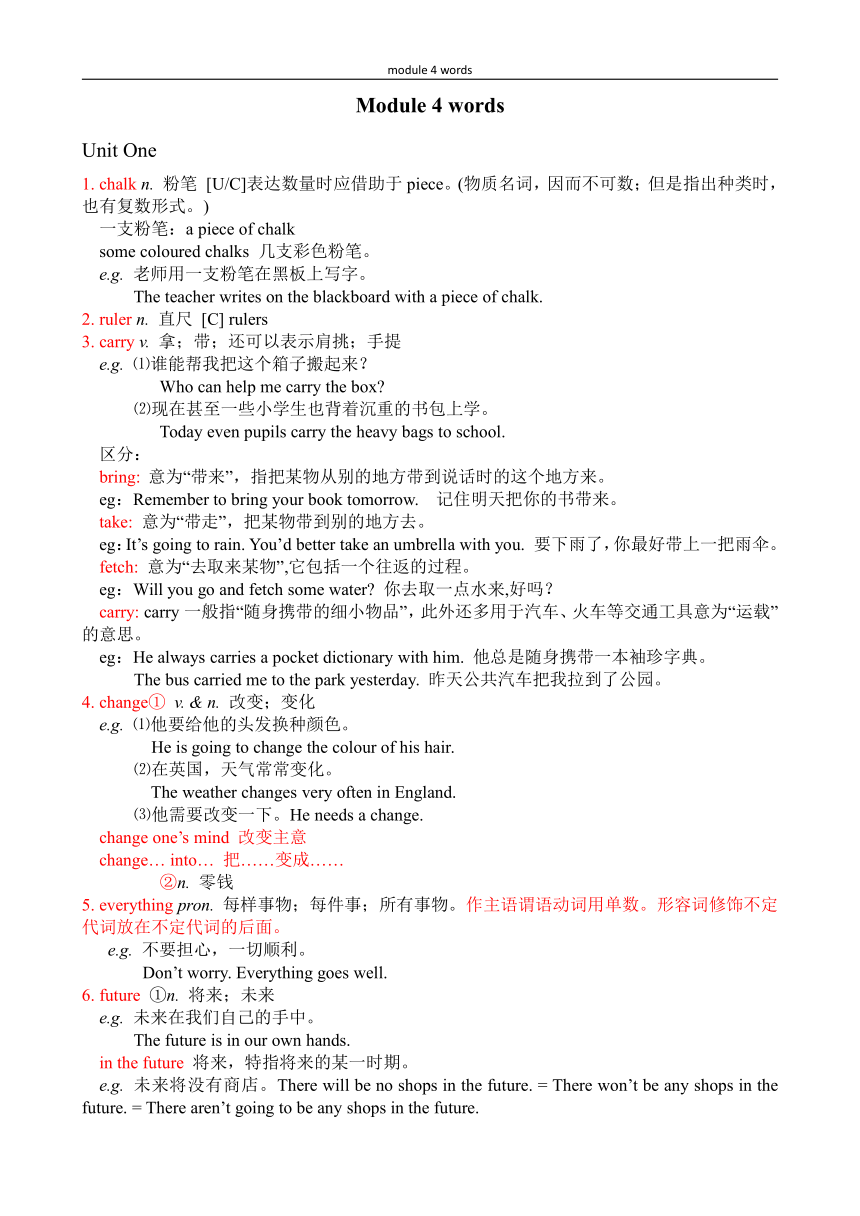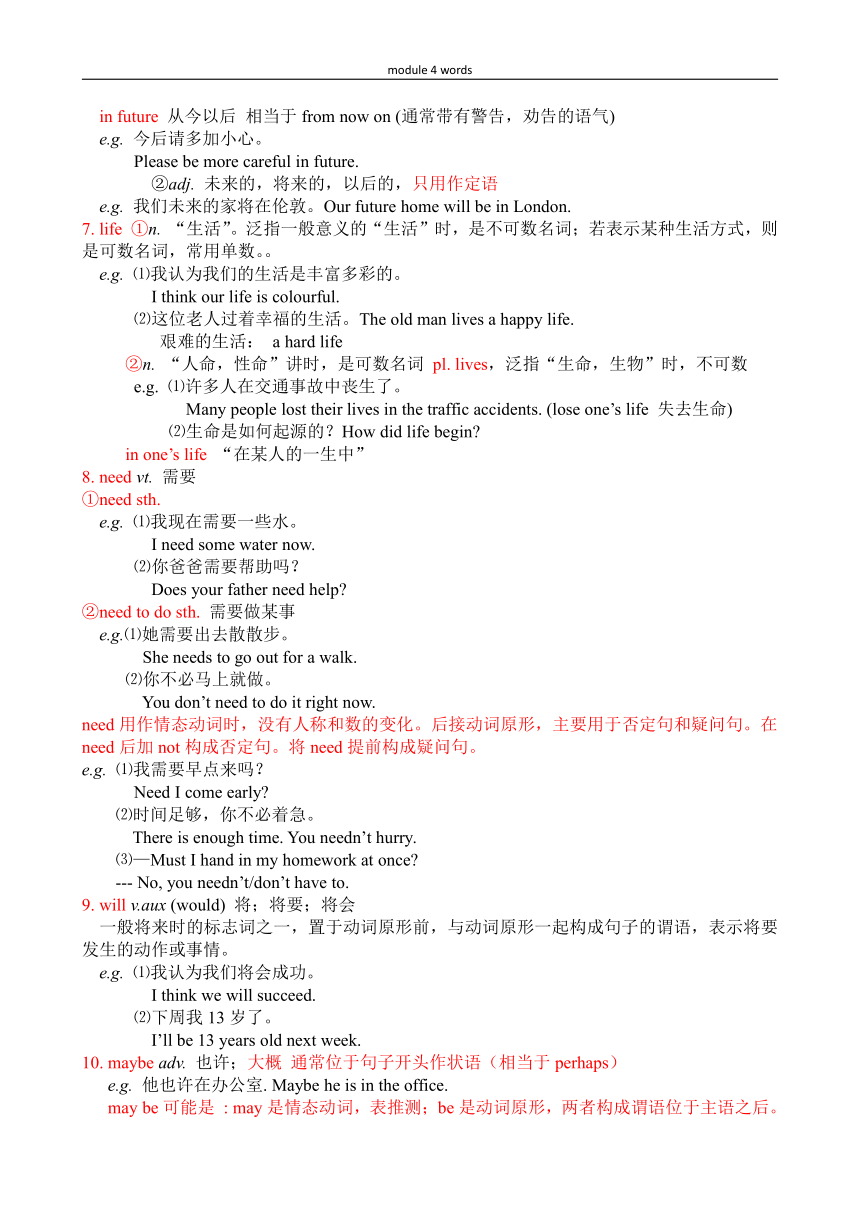Module 4 Life in the future Unit 1 Everyone will study at home知识点学案
文档属性
| 名称 | Module 4 Life in the future Unit 1 Everyone will study at home知识点学案 |  | |
| 格式 | zip | ||
| 文件大小 | 26.3KB | ||
| 资源类型 | 教案 | ||
| 版本资源 | 外研版 | ||
| 科目 | 英语 | ||
| 更新时间 | 2020-05-28 16:11:16 | ||
图片预览


文档简介
module
4
words
Module
4
words
Unit
One
1.
chalk
n.
粉笔
[U/C]表达数量时应借助于piece。(物质名词,因而不可数;但是指出种类时,也有复数形式。)
一支粉笔:a
piece
of
chalk
some
coloured
chalks
几支彩色粉笔。
e.g.
老师用一支粉笔在黑板上写字。
The
teacher
writes
on
the
blackboard
with
a
piece
of
chalk.
2.
ruler
n.
直尺
[C]
rulers
3.
carry
v.
拿;带;还可以表示肩挑;手提
e.g.
⑴谁能帮我把这个箱子搬起来?
Who
can
help
me
carry
the
box?
⑵现在甚至一些小学生也背着沉重的书包上学。
Today
even
pupils
carry
the
heavy
bags
to
school.
区分:
bring:
意为“带来”,指把某物从别的地方带到说话时的这个地方来。
eg:Remember
to
bring
your
book
tomorrow.
记住明天把你的书带来。
take:
意为“带走”,把某物带到别的地方去。
eg:It’s
going
to
rain.
You’d
better
take
an
umbrella
with
you.
要下雨了,你最好带上一把雨伞。
fetch:
意为“去取来某物”,它包括一个往返的过程。
eg:Will
you
go
and
fetch
some
water?
你去取一点水来,好吗?
carry:
carry一般指“随身携带的细小物品”,此外还多用于汽车、火车等交通工具意为“运载”的意思。
eg:He
always
carries
a
pocket
dictionary
with
him.
他总是随身携带一本袖珍字典。
The
bus
carried
me
to
the
park
yesterday.
昨天公共汽车把我拉到了公园。
4.
change①
v.
&
n.
改变;变化
e.g.
⑴他要给他的头发换种颜色。
He
is
going
to
change
the
colour
of
his
hair.
⑵在英国,天气常常变化。
The
weather
changes
very
often
in
England.
⑶他需要改变一下。He
needs
a
change.
change
one’s
mind
改变主意
change…
into…
把……变成……
②n.
零钱
5.
everything
pron.
每样事物;每件事;所有事物。作主语谓语动词用单数。形容词修饰不定代词放在不定代词的后面。
e.g.
不要担心,一切顺利。
Don’t
worry.
Everything
goes
well.
6.
future
①n.
将来;未来
e.g.
未来在我们自己的手中。
The
future
is
in
our
own
hands.
in
the
future
将来,特指将来的某一时期。
e.g.
未来将没有商店。There
will
be
no
shops
in
the
future.
=
There
won’t
be
any
shops
in
the
future.
=
There
aren’t
going
to
be
any
shops
in
the
future.
in
future
从今以后
相当于from
now
on
(通常带有警告,劝告的语气)
e.g.
今后请多加小心。
Please
be
more
careful
in
future.
②adj.
未来的,将来的,以后的,只用作定语
e.g.
我们未来的家将在伦敦。Our
future
home
will
be
in
London.
7.
life
①n.
“生活”。泛指一般意义的“生活”时,是不可数名词;若表示某种生活方式,则是可数名词,常用单数。。
e.g.
⑴我认为我们的生活是丰富多彩的。
I
think
our
life
is
colourful.
⑵这位老人过着幸福的生活。The
old
man
lives
a
happy
life.
艰难的生活:
a
hard
life
②n.
“人命,性命”讲时,是可数名词
pl.
lives,泛指“生命,生物”时,不可数
e.g.
⑴许多人在交通事故中丧生了。
Many
people
lost
their
lives
in
the
traffic
accidents.
(lose
one’s
life
失去生命)
⑵生命是如何起源的?How
did
life
begin?
in
one’s
life
“在某人的一生中”
8.
need
vt.
需要
①need
sth.
e.g.
⑴我现在需要一些水。
I
need
some
water
now.
⑵你爸爸需要帮助吗?
Does
your
father
need
help?
②need
to
do
sth.
需要做某事
e.g.⑴她需要出去散散步。
She
needs
to
go
out
for
a
walk.
⑵你不必马上就做。
You
don’t
need
to
do
it
right
now.
need用作情态动词时,没有人称和数的变化。后接动词原形,主要用于否定句和疑问句。在need后加not构成否定句。将need提前构成疑问句。
e.g.
⑴我需要早点来吗?
Need
I
come
early?
⑵时间足够,你不必着急。
There
is
enough
time.
You
needn’t
hurry.
⑶—Must
I
hand
in
my
homework
at
once?
---
No,
you
needn’t/don’t
have
to.
9.
will
v.aux
(would)
将;将要;将会
一般将来时的标志词之一,置于动词原形前,与动词原形一起构成句子的谓语,表示将要发生的动作或事情。
e.g.
⑴我认为我们将会成功。
I
think
we
will
succeed.
⑵下周我13岁了。
I’ll
be
13
years
old
next
week.
10.
maybe
adv.
也许;大概
通常位于句子开头作状语(相当于perhaps)
e.g.
他也许在办公室.
Maybe
he
is
in
the
office.
may
be可能是
:
may是情态动词,表推测;be是动词原形,两者构成谓语位于主语之后。
e.g.
他可能是一个军人。He
may
be
a
soldier.
=
May
be
he
is
a
soldier.
有时二者可以互换
11.
ask
①v.
询问;问
反义词:answer
e.g.
他问了我一个问题。He
asked
me
a
question.
②v.
请求;要求
ask
sb.(not)
to
do
sth.
请求、要求某人(不要)做某事。
e.g.老师叫我上学不要再迟到了。The
teacher
asks
me
not
to
be
late
for
school
again.
ask
for
sth.
请求,恳求(给予)某物
ask
for
help
请求帮助
e.g.
许多学生寻求关于学习英语的建议。
Many
students
ask
for
advice
about
learning
English.
12.
question
n.
问题
e.g.
这个孩子能回答一些简单的问题。
The
child
can
answer
some
easy
questions.
question:指人们主观上产生而提出的等待回答的问题,常作ask,
answer的宾语。
problem:指客观上存在的等待解决的问题,着重指困难的问题或者有关运算的问题。常作think
about,
solve(解决),work
out的宾语。
e.g.
⑴你可以问我任何问题。
You
can
ask
me
any
question.
(any
任何
用于肯定句,后接单数名词)
⑵Who
can
work
out
this
problem?
谁能解答这个问题?
13.
by
①prep.
用;靠;(表示方法,手段或方式,后面接名词、代词或动词-ing形式作宾语)
e.g.
我们彼此可以用微信聊天。We
can
talk
with
each
other
by
WeChat.
②prep.
乘(交通工具)
e.g.
我们打算乘火车去北京。We
are
going
to
Beijing
by
train.
③prep.
在……旁边;经过……,通过……
e.g.
⑴他正在门口等我们。
He
is
waiting
for
us
by
the
door.
⑵我弟弟每天从这幢楼旁边经过。
My
brother
goes
by
this
building
every
day.
14.
level
n.
水平
高水平
high
level
低水平
low
level
15.
able
adj.
能够……的
(可用作表语或者定语)
反义词:unable
e.g.
他是位有才能的经理。He
is
an
able
manager.
be
able
to
强调在具体事件中的能力,表示“经过努力而成功地做成某事”,具有人称和数的变化,可用于多种时态。否定形式:be
unable
to
do
sth.不能够做某事。
e.g.
⑴我确信这个女孩能够照顾自己。
I’m
sure
the
girl
will
be
able
to
look
after
herself.
⑵将来人们能够飞上月球。People
will
be
able
to
fly
to
the
moon
in
the
future.
can
通常指一般性的能力,表示“有能力做某事”,can没有人称和数的变化,有过去式could。
e.g.
鸟会飞翔。Birds
can
fly.
16.
more
adv.
更加;更
adj.
更多的
用法:
①用作形容词,“更多的”,是many和much的比较级,修饰可数名词复数或者不可数名词。
e.g.
办公室里有更多的书和更多的纸。
There
are
more
books
and
more
paper
in
the
office.
②用作副词,“更;更加”,用在多音节和部分双音节的形容词或副词前构成比较级。
more
interesting
③常见搭配:more
than
=
over
超过;多于
more
or
less
或多或少
once
more
再次
more
and
more…
越来越…
more
than
one
不止一个
(作主语,谓语动词用单数)
17.
not…
any
more
不再
=
no
more
(多强调数量上不再增加或动作上不再重复)
e.g.
⑴你不能再喝了。You
can’t
drink
any
more.
⑵我再也不那样做了。(两种)I
won’t
do
that
any
more.
=
I
will
do
that
no
more.
not
…any
longer
=
no
longer
不再(指时间和距离上“不再(延长)”)
e.g.这个老人不再住在这个房子里了。
The
old
man
doesn’t
live
in
the
house
any
longer.
=
The
old
man
no
longer
lives
in
the
house.
18.free
①adj.
(时间)空闲的;空余的=
have
time
反义词:busy
e.g.你今晚有空吗?
Are
you
free
tonight?
free
time
=
spare
time
业余时间
②adj.
免费的;自由的
e.g.
Are
these
books
free?
这些书是免费的吗?
自由
n.
freedom
4
words
Module
4
words
Unit
One
1.
chalk
n.
粉笔
[U/C]表达数量时应借助于piece。(物质名词,因而不可数;但是指出种类时,也有复数形式。)
一支粉笔:a
piece
of
chalk
some
coloured
chalks
几支彩色粉笔。
e.g.
老师用一支粉笔在黑板上写字。
The
teacher
writes
on
the
blackboard
with
a
piece
of
chalk.
2.
ruler
n.
直尺
[C]
rulers
3.
carry
v.
拿;带;还可以表示肩挑;手提
e.g.
⑴谁能帮我把这个箱子搬起来?
Who
can
help
me
carry
the
box?
⑵现在甚至一些小学生也背着沉重的书包上学。
Today
even
pupils
carry
the
heavy
bags
to
school.
区分:
bring:
意为“带来”,指把某物从别的地方带到说话时的这个地方来。
eg:Remember
to
bring
your
book
tomorrow.
记住明天把你的书带来。
take:
意为“带走”,把某物带到别的地方去。
eg:It’s
going
to
rain.
You’d
better
take
an
umbrella
with
you.
要下雨了,你最好带上一把雨伞。
fetch:
意为“去取来某物”,它包括一个往返的过程。
eg:Will
you
go
and
fetch
some
water?
你去取一点水来,好吗?
carry:
carry一般指“随身携带的细小物品”,此外还多用于汽车、火车等交通工具意为“运载”的意思。
eg:He
always
carries
a
dictionary
with
him.
他总是随身携带一本袖珍字典。
The
bus
carried
me
to
the
park
yesterday.
昨天公共汽车把我拉到了公园。
4.
change①
v.
&
n.
改变;变化
e.g.
⑴他要给他的头发换种颜色。
He
is
going
to
change
the
colour
of
his
hair.
⑵在英国,天气常常变化。
The
weather
changes
very
often
in
England.
⑶他需要改变一下。He
needs
a
change.
change
one’s
mind
改变主意
change…
into…
把……变成……
②n.
零钱
5.
everything
pron.
每样事物;每件事;所有事物。作主语谓语动词用单数。形容词修饰不定代词放在不定代词的后面。
e.g.
不要担心,一切顺利。
Don’t
worry.
Everything
goes
well.
6.
future
①n.
将来;未来
e.g.
未来在我们自己的手中。
The
future
is
in
our
own
hands.
in
the
future
将来,特指将来的某一时期。
e.g.
未来将没有商店。There
will
be
no
shops
in
the
future.
=
There
won’t
be
any
shops
in
the
future.
=
There
aren’t
going
to
be
any
shops
in
the
future.
in
future
从今以后
相当于from
now
on
(通常带有警告,劝告的语气)
e.g.
今后请多加小心。
Please
be
more
careful
in
future.
②adj.
未来的,将来的,以后的,只用作定语
e.g.
我们未来的家将在伦敦。Our
future
home
will
be
in
London.
7.
life
①n.
“生活”。泛指一般意义的“生活”时,是不可数名词;若表示某种生活方式,则是可数名词,常用单数。。
e.g.
⑴我认为我们的生活是丰富多彩的。
I
think
our
life
is
colourful.
⑵这位老人过着幸福的生活。The
old
man
lives
a
happy
life.
艰难的生活:
a
hard
life
②n.
“人命,性命”讲时,是可数名词
pl.
lives,泛指“生命,生物”时,不可数
e.g.
⑴许多人在交通事故中丧生了。
Many
people
lost
their
lives
in
the
traffic
accidents.
(lose
one’s
life
失去生命)
⑵生命是如何起源的?How
did
life
begin?
in
one’s
life
“在某人的一生中”
8.
need
vt.
需要
①need
sth.
e.g.
⑴我现在需要一些水。
I
need
some
water
now.
⑵你爸爸需要帮助吗?
Does
your
father
need
help?
②need
to
do
sth.
需要做某事
e.g.⑴她需要出去散散步。
She
needs
to
go
out
for
a
walk.
⑵你不必马上就做。
You
don’t
need
to
do
it
right
now.
need用作情态动词时,没有人称和数的变化。后接动词原形,主要用于否定句和疑问句。在need后加not构成否定句。将need提前构成疑问句。
e.g.
⑴我需要早点来吗?
Need
I
come
early?
⑵时间足够,你不必着急。
There
is
enough
time.
You
needn’t
hurry.
⑶—Must
I
hand
in
my
homework
at
once?
---
No,
you
needn’t/don’t
have
to.
9.
will
v.aux
(would)
将;将要;将会
一般将来时的标志词之一,置于动词原形前,与动词原形一起构成句子的谓语,表示将要发生的动作或事情。
e.g.
⑴我认为我们将会成功。
I
think
we
will
succeed.
⑵下周我13岁了。
I’ll
be
13
years
old
next
week.
10.
maybe
adv.
也许;大概
通常位于句子开头作状语(相当于perhaps)
e.g.
他也许在办公室.
Maybe
he
is
in
the
office.
may
be可能是
:
may是情态动词,表推测;be是动词原形,两者构成谓语位于主语之后。
e.g.
他可能是一个军人。He
may
be
a
soldier.
=
May
be
he
is
a
soldier.
有时二者可以互换
11.
ask
①v.
询问;问
反义词:answer
e.g.
他问了我一个问题。He
asked
me
a
question.
②v.
请求;要求
ask
sb.(not)
to
do
sth.
请求、要求某人(不要)做某事。
e.g.老师叫我上学不要再迟到了。The
teacher
asks
me
not
to
be
late
for
school
again.
ask
for
sth.
请求,恳求(给予)某物
ask
for
help
请求帮助
e.g.
许多学生寻求关于学习英语的建议。
Many
students
ask
for
advice
about
learning
English.
12.
question
n.
问题
e.g.
这个孩子能回答一些简单的问题。
The
child
can
answer
some
easy
questions.
question:指人们主观上产生而提出的等待回答的问题,常作ask,
answer的宾语。
problem:指客观上存在的等待解决的问题,着重指困难的问题或者有关运算的问题。常作think
about,
solve(解决),work
out的宾语。
e.g.
⑴你可以问我任何问题。
You
can
ask
me
any
question.
(any
任何
用于肯定句,后接单数名词)
⑵Who
can
work
out
this
problem?
谁能解答这个问题?
13.
by
①prep.
用;靠;(表示方法,手段或方式,后面接名词、代词或动词-ing形式作宾语)
e.g.
我们彼此可以用微信聊天。We
can
talk
with
each
other
by
WeChat.
②prep.
乘(交通工具)
e.g.
我们打算乘火车去北京。We
are
going
to
Beijing
by
train.
③prep.
在……旁边;经过……,通过……
e.g.
⑴他正在门口等我们。
He
is
waiting
for
us
by
the
door.
⑵我弟弟每天从这幢楼旁边经过。
My
brother
goes
by
this
building
every
day.
14.
level
n.
水平
高水平
high
level
低水平
low
level
15.
able
adj.
能够……的
(可用作表语或者定语)
反义词:unable
e.g.
他是位有才能的经理。He
is
an
able
manager.
be
able
to
强调在具体事件中的能力,表示“经过努力而成功地做成某事”,具有人称和数的变化,可用于多种时态。否定形式:be
unable
to
do
sth.不能够做某事。
e.g.
⑴我确信这个女孩能够照顾自己。
I’m
sure
the
girl
will
be
able
to
look
after
herself.
⑵将来人们能够飞上月球。People
will
be
able
to
fly
to
the
moon
in
the
future.
can
通常指一般性的能力,表示“有能力做某事”,can没有人称和数的变化,有过去式could。
e.g.
鸟会飞翔。Birds
can
fly.
16.
more
adv.
更加;更
adj.
更多的
用法:
①用作形容词,“更多的”,是many和much的比较级,修饰可数名词复数或者不可数名词。
e.g.
办公室里有更多的书和更多的纸。
There
are
more
books
and
more
paper
in
the
office.
②用作副词,“更;更加”,用在多音节和部分双音节的形容词或副词前构成比较级。
more
interesting
③常见搭配:more
than
=
over
超过;多于
more
or
less
或多或少
once
more
再次
more
and
more…
越来越…
more
than
one
不止一个
(作主语,谓语动词用单数)
17.
not…
any
more
不再
=
no
more
(多强调数量上不再增加或动作上不再重复)
e.g.
⑴你不能再喝了。You
can’t
drink
any
more.
⑵我再也不那样做了。(两种)I
won’t
do
that
any
more.
=
I
will
do
that
no
more.
not
…any
longer
=
no
longer
不再(指时间和距离上“不再(延长)”)
e.g.这个老人不再住在这个房子里了。
The
old
man
doesn’t
live
in
the
house
any
longer.
=
The
old
man
no
longer
lives
in
the
house.
18.free
①adj.
(时间)空闲的;空余的=
have
time
反义词:busy
e.g.你今晚有空吗?
Are
you
free
tonight?
free
time
=
spare
time
业余时间
②adj.
免费的;自由的
e.g.
Are
these
books
free?
这些书是免费的吗?
自由
n.
freedom
同课章节目录
- Module 1 Lost and found
- Unit 1 Whose bag is this?
- Unit 2 Are they yours?
- Unit 3 Language in use
- Module 2 What can you do ?
- Unit 1 I can play the piano
- Unit 2 I can run really fast
- Unit 3 Language in use
- Module 3 Making plans
- Unit 1 What are you going to do at the weekends?
- Unit 2 We're going to cheer the players.
- Unit 3 Language in use
- Module 4 Life in the future
- Unit 1 Everyone will study at home
- Unit 2 Every family will have a small plane.
- Unit 3 Language in use
- Module 5 Shopping
- Unit 1 What can I do for you?
- Unit 2 You can buy everything on the Internet
- Unit 3 Language in use
- Module 6 Around town
- Unit 1 Could you tell me how to get to the Nationa
- Unit 2 The London Eye is on your right.
- Unit 3 Language in use
- Revision module A
- Module 7 My past life
- Unit 1 I was born in a small village.
- Unit 2 I was born in Quincy.
- Unit 3 Language in use
- Module 8 Story time
- Unit 1 Once upon a time….
- Unit 2 Goldilocks hurried out of the house.
- Unit 3 Language in use
- Module 9 Life history
- Unit 1 He left school and began work at the age of
- Unit 2 He decided to be an actor.
- Unit 3 Language in use
- Module 10 A holiday journey
- Unit 1 What did you do?
- Unit 2 This morning we took a walk.
- Unit 3 Language in use
- Module 11 Body language
- Unit 1 They touch noses!
- Unit 2 Here are some ways to welcome them.
- Unit 3 Language in use
- Module 12 Western music
- Unit 1 It's so beautiful!
- Unit 2 Vienna is the centre of European classical
- Unit 3 Language in use
- Revision module B
